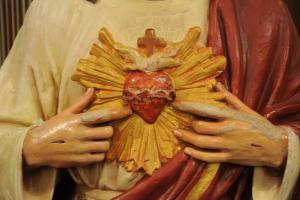
Because God’s activity can be said to be not other than the divine essence, even if we apprehend the activity in a way which is less than the essence itself. saying God is love means God loves just as much as saying God loves means God is love. God’s love is a perfect love. God’s love is eternal. For God’s love to be perfect in eternity, it needs an eternal, as well as a temporal, subject who can experience and receive that love. The eternal love is revealed to us in the Trinity, with the Father loving the Son, the Son loving the Father, and the Father and Son together loving the Spirit, even as the Father and Spirit love each other and love the Son together, and the Son and the Spirit love each other as they love the Father together. The revelation of the Trinity shows to us that God’s perfect, eternal love, is at once particular and communal, as the persons of the Trinity love each other and love each other in union with each other. Together as one, as well as in and through the particular persons, the Trinity loves what it establishes in the act of creation. They give themselves over themselves to creation, making room for created subjects to experience the love which they offer as well as giving those created subjects the freedom to decide if they will return that love back to God.
Love generates love. The fulfillment of love is love itself. The expression of that love can be done in and through several forms. In regards the way created subjects render that love to God, to the absolute source and foundation of all things, that type of love can be defined not only as worship, but the greatest form of worship, adoration.[1] When such love is given over to God, in and through a variety of ways, some more ritualistic (even as there are often rituals followed in the giving and receiving of love in human society), some much more ad hoc, God is pleased. This is not because God is narcissistic, seeking validation by such worship, but because love is fulfilled with love, and worship is a medium by which God and created subjects can render love to each other (despite the ontological differences had between the lovers).
Love, then, is the point of worship. As love can be expressed in a variety of ways, some which are more symbolic and filled with tokens of love, some which are more direct and not as symbolic, there can be, indeed, there will forms of worship which are ritualistic, engaging such symbols through such rituals, even as there will be other forms of worship, much more immediate and less symbolic, those often associated with mystic states, where the transcendent love of God engulfs the persons in such a way that they find themselves in an ecstatic state beyond their own comprehension, and so beyond all the use of symbols (even if, later, when those states are described, they can and will be discussed in and through metaphoric symbols). Thus, while various forms of worship transcend ritual and all the symbols and tokens associated with them, this does not mean ritualistic, symbolic forms of worship are meaningless, for indeed, they help those who have not yet attained such mystical states even as they also help mediate the love which is being shared in a form which the created subject can better understand.
This should help us ascertain why, though God in God’s essential perfection does not “need” worship, indeed, does not need anything from creation, in another sense, due to God’s “nature” revealed in and through the divine energies, that is, in and through love, can be said to desire our love and in that way “need it.” For our love fulfills and complements the love which God has in the divine nature itself. We have to recognize that this paradox forms, in part, because we look at things from a temporal perspective, and our discussion of necessity relates to such temporality, something which does not represent the reality of God’s transcendent eternity. What is contained in time, and follows the causality related to temporal existence, is contained in God and with God in God’s eternal experience and activity. Our love, even though it is experienced and expressed temporally so long as our mode of being is temporal, is experienced by God in eternity, so that God’s perfection always contains within it what is found in temporality, including, and especially our love. Because our love is experienced by God in God’s eternity, we are capable of transcending our temporality and finding ourselves drawn into that eternity, participating in it for ourselves; this is what happens in our theosis (or deification). We are brought into the eschaton and then participate in the eternal uncreated energies of God, including and especially, love; we discover that our love, though it has a temporal form for its basis, and thus, has a starting point in time, is taken out of time and becomes never-ending, and it is this never-ending, participates in eternity as it is joined in and with God’s love. And so, while it has a temporal foundation for us, and so a beginning in which it can be found, for God and God’s eternity, it is always with God, showing how God’s perfection is eternal and not at all infringed due to God’s loving relationship with us. That is, while talk God’s perfection, and with it, the fact that God needs nothing due to that perfection, reveals a truth, we must understand it is a truth which is complemented by the fact that creation has a value, one God has given it, and so its existence and participation in eternity is already a part of what is found in God’s perfection.
False piety, false love, expressed in and through all kinds of grand gestures, such as is found in various liturgical rites, when done merely out of obligation, is far less worthy of God, far less pleasing to God, than people engaging God with honest love, even if that means we are not so engaged in liturgy and liturgical rites. “It is of more concern for the greatest King to be honoured in earnest than for Him to be honoured by this or that token or gesture.” [2] Thus, “He prefers to be worshiped in whatever way, even incompetently, provided it is in keeping with human nature, than not to be worshiped at all out of pride. ”[3] Again, it is important to understand worship here really represents a way of love. When someone goes to worship God out of obligation, instead of love, they have undermined the true value of worship. God doesn’t want artificial respect, God wants love, and worship is a medium for that love, but beyond that, God wants love, whatever way it is best given by a person:
In and of Himself, God is the highest good, the truth of things, the light and fervour of minds. Therefore, they who venerate God diligently through the goodness of their actions, with truthfulness, with what clarity of mind they can, and with what love is due, they above all others – indeed alone – worship Him unerringly. [4]
True worship, connected as it is with love for God, will be connected with all that God reveals to us as good and true. We are not intended to become mere sycophants, those who would turn worship into an act of sheer obligation for God. For such worship will not give to God the love which God desires, nor will we receive the glory which is given to those who unite with God in love.
Since love is the most important element, those who reach out to God with love, but riddled with ignorance, and so with all kinds of error, do something which pleases God, and in that way, their love, their worship, opens them up to receive something from God’s love, indeed. God’s grace in return. The more they engage God with that love, the more they will receive and so the more they will learn from what God reveals to them. They will slowly purify their understanding, and so, they will change their way to meet what has been revealed to them. Thus, even if, at first, their way of reaching out to God might be seen in and through some form of idolatry, their pursuit for God with love can lead them to God and away from God’s wrath. Of course, once they come to realize what is wrong with what they have done (or believed), if they continue to follow where their love directs them, they will forgo such errors; on the other hand, if they decide to continue in their error, and willfully ignore what God reveals to them, they will lose their connection with God’s love, and so find themselves experiencing the consequences of that disconnection, metaphorically represented by God’s wrath. We can get a sense of that in Jerome’s commentary on Daniel, commenting upon what happened in its fifth chapter:[5]
How great was their folly! As they drank from golden vessels, they were praising gods of wood and of stone. As long as the vessels had been in the idol-temple of Babylon, God was not moved to wrath, for they had evidently consecrated the property of God to divine worship, even though they did so in accordance with their own depraved views of religion. But after they defiled holy things for the use of men, their punishment followed upon the heels of their sacrilege. Moreover they were praising their own gods and scoffing at the God of the Jews, on the ground that they were drinking from His vessels because of the victory their own gods had bestowed upon them. Applying this figuratively, we should have to say that it applies to all the heretics or to any doctrine which is contrary to truth but which appropriates the words of the Biblical prophets and misuses the testimony of Scripture to suit its own inclination. [6]
God’s wrath is kept away when love is in play, because that love is able to work in and through those who embrace it, allowing them to become better without having to deal with the consequences of their unlove. However, when love is not involved, then, even if someone speaks and preaches what can be said to be true so that their words are orthodox, they are far away from God, as their hearts are not for God. They are looking for honors and privileges due to the words they speak, and though they might get them from society, they really do not stand for and engage the truth; they offer it only in its external form, that is, without the inner core which keeps it from crumbling apart. What they provide, therefore, is but a distorted, hollow representation, one which will slowly away give in to its hollow nature and decay (which is why speaking the right words is never enough to present the truth and make sure it remains attractive to society at large). And so, those who will follow such a simulacra of the truth will find themselves diverted from its fullness by those who misrepresent it in this fashion: “On the other hand, those who hanker after rank and power are found in places of worship and in religious circles and become a seduction for the masses. Falling from the way themselves, they divert others from it as well!” [7]
Truth is truly revealed in love, and without that love, facts, however correctly stated, fall from the fullness of the truth itself. Facts are not the truth when they are presented without love, even as they are not true without goodness and beauty. We, therefore, must not neglect love in our pursuit of the truth and goodness, lest, all we do is deceive ourselves by mere appearances of the truth. Worship helps keep us connected to love, but only if we embrace worship in the way it is to be embraced, as a way to mediate and share the uncreated love of God with creation, and the love of creation with the uncreated love of God. When it is turned it something else, it, too, can divert us from the truth and goodness which we need, and so lead us astray and into idolatry (as, for example, we learn happened with the use of the Nehushtan). God loves us, and wants us to love back, to share in and experience the divine love. When we embrace God in this way, through unity with God by the means of love love, will we truly come to the realization of truth, goodness, and beauty.
[1] While adoration, λατρεία, technically is the word used to describe the worship and love which is due to God alone, the term can be used analogically in relation to created subjects, who then give to each other as much love as is possible without it becoming idolatry. And as worship can mean to give someone honor or respect, those who love each other, can also be said to worship each other, though once again, with a sense of analogy going on with the word worship, recognizing how it is employed for created subjects (such as used when talking about hero worship) differs from the way it is employed when talking about the worship which is God alone is worthy to receive.
[2] Marsilio Ficino, On the Christian Religion. Trans. Dan Attrell, Brett Bartlett, and David Prreca (Toronto: University of Toronto Press, 2022), 54.
[3] Marsilio Ficino, On the Christian Religion, 54
[4] Marsilio Ficino, On the Christian Religion, 54.
[5] “King Belshazzar made a great feast for a thousand of his lords, and drank wine in front of the thousand. Belshazzar, when he tasted the wine, commanded that the vessels of gold and of silver which Nebuchadnezzar his father had taken out of the temple in Jerusalem be brought, that the king and his lords, his wives, and his concubines might drink from them. Then they brought in the golden and silver vessels which had been taken out of the temple, the house of God in Jerusalem; and the king and his lords, his wives, and his concubines drank from them. They drank wine, and praised the gods of gold and silver, bronze, iron, wood, and stone” (Dan. 5:1-4 RSV).
[6] St. Jerome, Commentary on Daniel. Trans. Gleason L. Archer Jr. (Grand Rapids, MI: Baker Book House, 1958; repr. Eugene, OR: Wipf & Stock, 2009) 56.
[7] Sharafuddin Maneri, The Hundred Letters. Trans. Paul Jackson, SJ (New York: Paulist Press, 1980), 334-5 [Letter 82].
Stay in touch! Like A Little Bit of Nothing on Facebook.
If you liked what you read, please consider sharing it with your friends and family!













